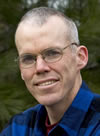 In mid-January, a few of us launched a Web site: stepitup07.org. We didn’t have a big group behind us, and we didn’t have any money – just an idea, that the time had finally come for Americans to move past concern about global warming and on to real action. We’d organized a march across Vermont last summer, which was a great success – it convinced all of our congressional candidates, from socialists to conservative Republicans, to put global warming front and center in their campaigns. But the final day of the50-mile pilgrimage drew 1,000 people – and we were shocked to read in the newspapers that that represented the biggest demonstration about climate change in American history.
In mid-January, a few of us launched a Web site: stepitup07.org. We didn’t have a big group behind us, and we didn’t have any money – just an idea, that the time had finally come for Americans to move past concern about global warming and on to real action. We’d organized a march across Vermont last summer, which was a great success – it convinced all of our congressional candidates, from socialists to conservative Republicans, to put global warming front and center in their campaigns. But the final day of the50-mile pilgrimage drew 1,000 people – and we were shocked to read in the newspapers that that represented the biggest demonstration about climate change in American history.
So we picked a day – April 14 – and asked people around the nation to organize demonstrations: on church steps and in city parks, and anywhere else that seemed appropriate. We sent out a bunch of emails. And then we waited. But not for long. In the course of a month, more than 600 groups have signed up to host StepItUp rallies on April 14. It’s going to be one of the biggest environmental protests since Earth Day 1970. So far they’re planned in 47 states. And more to the point, they represent a fount of unbelievable creativity: Scuba divers are organizing underwater demonstrations off the endangered coral reefs of Key West and Maui; climbers are planning to hang banners from some of the country’s greatest rock walls; people will gather on the levees in New Orleans, and along the someday-tidelines in many of America’s coastal cities, painting blue stripes to show where the water will come unless we take action; musicians are sending in songs; and one artist organized 800 school kids in Utah to spell out StepItUp with their bodies on the school playground and then took a picture from a helicopter.
And all this without, so far, one single story in the conventional media. The information is just online. Why the response? Because people understand what a crisis we face, but have felt overwhelmed by it. Just by issuing an invitation, we’ve given people a chance to act on their deep love for creation, their deep love for the people (poor people, mostly, at least at first) directly threatened by this greatest of crises, and their deep love for the future. I didn’t know if people would respond, but I know now. What a wonderful feeling to click on the website every day and see the spirit at work.

Bill McKibben wrote the first book for a general audience about global warming, The End of Nature, way back in 1989. His new book is Deep Economy: The Wealth of Communities and the Durable Future .

